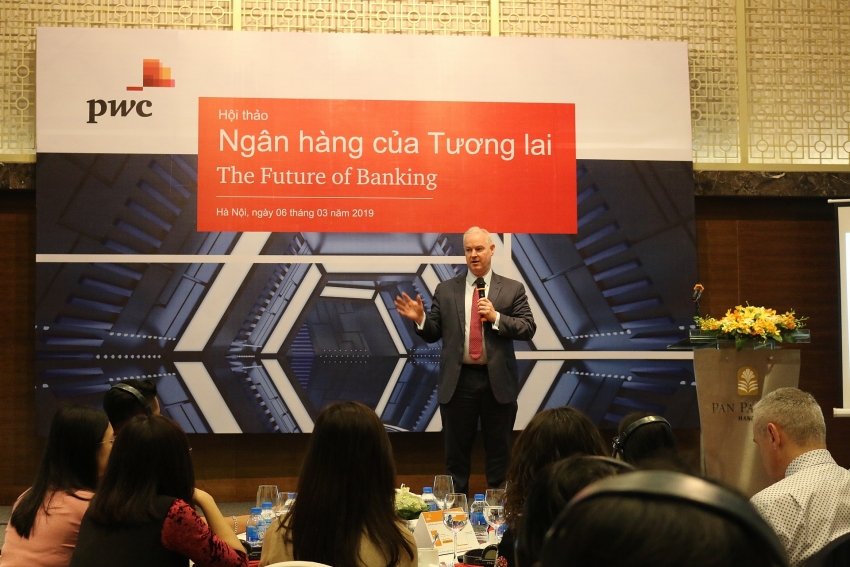PwC global experts discuss the future of banking
 |
| Global financial services leader of PwC John Garvey |
John Garvey, together with a panel of distinguished industry experts from the US, Canada, Southeast Asia, Hong Kong, and Japan discussed what it takes for banks to thrive in this digital age, while maintaining their human relationships. The event attracted senior leaders from various Vietnamese commercial banks.
According to PwC, the banking industry is facing an imperative to change brought about by powerful forces, namely customer expectations, technological capabilities, regulatory requirements, demographics, and economics. Banks need to get ahead of these challenges and transform themselves for future success.
Focus on the customer
In particular, discussions at the event pointed to a strong interest in building a future bank that can cater to every customer’s needs across different stages of life in a unique, personalised way.
“The future of banking is about a highly-digitised customer experience and the expansion from traditional banking services to providing “lifestyle” services that cover customers’ needs across the whole of their lives,” John Garvey said.
 |
| Grant Dennis, general director of PwC Consulting Vietnam |
“Banks need to look at the lifestyle of each customer and understand what needs or ambitions they have, whether it is to buy a car, buy an apartment or start a family. Banks should be in a position to help the customer achieve those personal goals through the use of their services, such as savings, loans, life insurance or third-party products like health insurance,” Grant Dennis, general director of PwC Consulting Vietnam, elaborated.
Most importantly, banks should be able to envision the needs of the customer and offer respective services even before the customer knows or asks for them. This is possible through proactive data analytics-driven customer insights, enabled by smart technologies and very often by partnering with fintech companies or other solution providers.
To demonstrate the latest solutions for data-driven insights, PwC specialists introduced the Customer Insights Platform at the event. This data analytics solution was developed by PwC and has been implemented successfully at some of the leading financial institutions in the world.
By combining and analysing data from different parts within the business and external sources, it helps banks answer questions like: Which customers are likely to be most valuable over time? Which channels offer the greatest growth opportunities? What can banks do to grow their customer value through cross-sells and upsells? What is the maximum “willingness to pay” for a certain product? With such insights, banks will be able to segment their customers and understand them with greater detail than ever. This will be the basis to grow and retain highly valuable customer relationships.
 |
| A discussion panel at PwC's event |
Compliance with regulations
Industry experts at the event also discussed the fact that more regulations are being established around the world to manage the complexity of the banking sector and new banking activities. In Vietnam, with the adoption of Basel II, local banks will need to assess their current data governance processes and adopt proper controls to raise their risk resilience.
“Vietnam has been going through an exciting time of change with higher risk management standards and best practices adopted by the banking sector. The banks that are well-prepared with a proper implementation strategy will have a better chance to succeed and gain benefits,” Dinh Hong Hanh, financial services consulting partner of PwC Consulting Vietnam, said.
 |
Furthermore, while the technologies available in the market provide an opportunity for unprecedented innovation, not all of them are covered by existing regulations. Therefore, PwC experts advised banks to become more proactive in conversations with lawmakers, to develop a regulatory landscape that nurtures innovation and consumer trust.
“Despite the emergence of new competitors, we believe that the traditional bank still has a bright future if it acts now and makes appropriate changes to be future-ready. Staying the same is not an option. The banks that will succeed are those who can best employ digital and data technologies to elevate customer experience and improve regulatory compliance,” Garvey concluded.
What the stars mean:
★ Poor ★ ★ Promising ★★★ Good ★★★★ Very good ★★★★★ Exceptional
 Tag:
Tag:
Related Contents
Latest News
More News
- Vietnamese consumers express concern about climate change (October 11, 2025 | 14:06)
- ESG seen as key to Vietnam’s business credibility and capital attraction (September 29, 2025 | 18:38)
- From compliance to strategy: ESG criteria gaining ground (September 29, 2025 | 15:47)
- Vietnamese firms step up ESG game (September 23, 2025 | 15:26)
- Vietnam tax and legal changes set to shape foreign investment landscape (September 16, 2025 | 13:46)
- Vietnamese businesses navigate US tariffs (June 25, 2025 | 12:14)
- The impact of cloud, AI, and data on financial services (April 14, 2025 | 11:20)
- Vietnam 2025 M&A outlook: trends, deals, and opportunities (March 21, 2025 | 08:54)
- Vietnam's M&A landscape mirrors global trends (February 18, 2025 | 17:13)
- Asia-Pacific CEOs enter 2025 with optimism and caution (February 06, 2025 | 17:16)

























 Mobile Version
Mobile Version